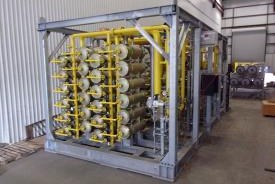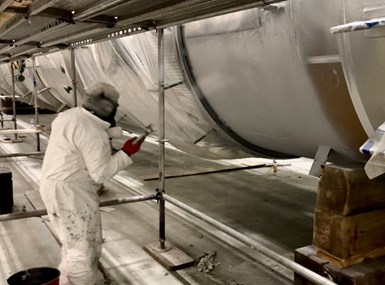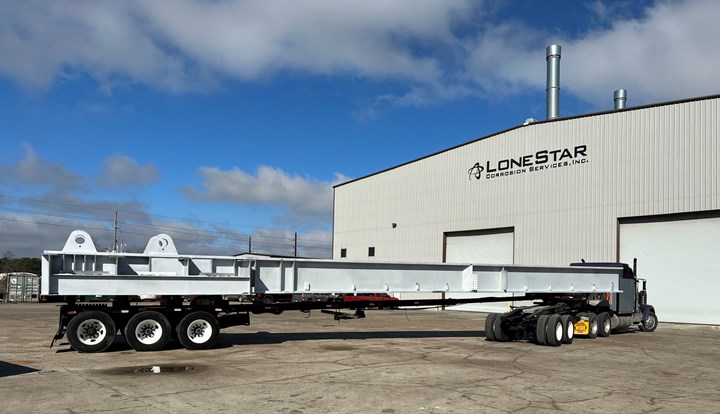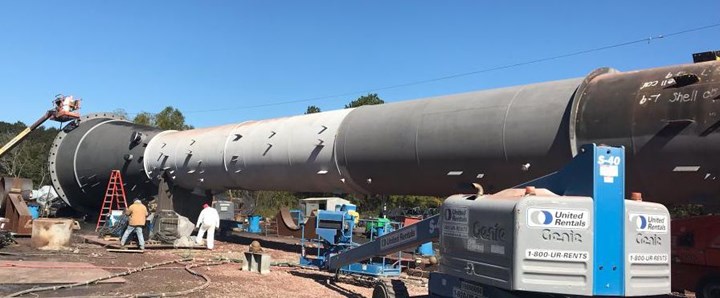Since the day he opened the doors to his coating shop 21 years ago, Glen Cronin has consistently asked himself how his company can save its customers money, reduce their delivery turnaround times and add value to their processes. Eliminating trucks was one way that was obvious to him.
“Trucks are a no-value-added service and a liability every time you put something on them,” Cronin says. “So, we can eliminate the use of trucks by offering more services in-house.”
Each year, he says his company, LoneStar Corrosion Services Inc. (Houston, Texas) — which provides blasting, wet film, thermal spray, PFP intumescent fireproofing, zinc phosphate, powder coating and more — adds processes that previously were not a part of the business to create a one-stop shop.
In addition to this continuous improvement strategy implemented from the beginning, this PF Top Shop has diversified its customer base over the past several years from its traditional oil and gas customers like Shell, ExxonMobil and Schlumberger to automotive, construction and heavy equipment

LoneStar offers in-house hydro testing up to 27,000 psi. Customers supply test fixtures and can get the testing, NDE and coating done at a single shop. Source (all photos): LoneStar Corrosion Services Inc.
companies such as Tesla, Caterpillar and Graywolf Schuff. The completion of one spacecraft manufacturer’s project has been especially exciting and rewarding for the shop.
Big capabilities
When it opened in 2003, LoneStar’s Houston facility was a third of the size it is now. Cronin built a 90,000-square-foot facility in New Iberia, Louisiana, in 2008, which he sold in 2012. He then bought an 18-wheel semi-truck that he sends back and forth to service Louisiana customers at no charge for the trucking. Then, behind the original Houston facility which he no longer owns, he built the current 88,000-square-foot headquarters.
Cronin is enthusiastic about thinking big when it comes to his business. He once approached a colleague about merging LoneStar with the colleague’s company. The other businessman turned him down, basically telling Cronin he was comfortable doing what he was doing. In response, Cronin said, “You’re right, it’s probably better we don’t join because I have no limits.” He explains to PF, “Building a business is like teaching a child and watching him grow to an adult. If you are limiting your business, you’ve limited yourself in the organization and your ability to improve.”
The 74-employee company is ISO 9001-2015 compliant and has a long list of industries it serves. Its customers dabble in not only oil and gas, construction and heavy equipment, but also upstream, midstream, downstream, environmental, wastewater, chemical, refinery, rail, food and beverage, mining, marine, and aerospace, to name most. It offers coatings as well as assembly/disassembly of equipment such as drilling risers, production equipment, process equipment and other process packages. Its staff can handle controls, electrical, piping and tubing installation.
The building also houses two 20 ft. by 25 ft. by 70 ft. and one 20 ft. by 20 ft. by 25 ft. indoor blast rooms which offer aluminum oxide, steel grit, glass bead and walnut blasting. The all-indoor facility is also furnished with lifting equipment for very large projects. It has four, 40-ton overhead cranes with
LoneStar is approved to apply PFP Intumescent Fire Proof Coatings by all the major manufacturers in the industry, the company says. These coatings can be shop applied or field applied and spray or trowel applied processes are used to complete jobs for the highest standards.
lift capacities of 160,000 lbs as well as four 15-ton overhead cranes, all with hook heights to 39 ft.
Creating more value in-house
To hold true to its company philosophy to provide unparalleled quality, competitive prices and on-time delivery, according to Cronin, the LoneStar team has discovered ways to add value for its customers by providing more in-house services. It offers an array of coatings, testing, non-destructive examinations (by customers’ approved vendors lists), as well as assembly and disassembly services, hydro testing to 27,000 psi, field services and more, all under one roof.
“In other words, a customer can fabricate the product, bring it to us, we’ll hydro it, get nondestructive testing done through an approved vendor, and then we will take over the coatings,” Cronin explains. “When it’s complete, we will put it all together for them. We’ve got guys who can do all of it.”
By doing so, not only were the costs of using three or four trucks for transporting products to outsource processes eliminated, but also the need for three or four different vendors. And because value-added services save the customer time and money, these companies are more competitive in their markets, Cronin says. LoneStar also benefits, he says, by charging slightly more because it is more competitive now that the no-value-added services have been removed.
Firing up a specialty service
After the COVID pandemic, the LoneStar management team took some time to reconsider its customer base and how it could grow. At that time the oil and gas industry had cancelled many of its orders and the shop already had been pivoting away from that industry. With its experience in the construction industry, the company decided to offer passive fire protection (PFP) intumescent fireproofing.
In the wake of the World Trade Center tragedy and the fire at Macondo Prospect in the Gulf of Mexico, Cronin says the requirements for fireproofing buildings increased. Therefore, the need for the epoxy fireproof finishing is present, especially for customers on the Gulf Coast where LoneStar is located.
But this more recent service offering has helped the company expand its outreach to other areas of the country and the world, opening doors to new projects from Tesla (which was already a customer) and the Indian Oil Co., for example.
Spacecraft project
One spacecraft company has benefitted from LoneStar’s thermal spray coating services. For this project, the coating shop applied thermal zinc spray coating on the four legs of an integration tower. With each leg section weighing 100,000 lbs and when assembled each leg stands 40 stories tall, the coating task was no small feat. However, with the legs separated into sections, it was possible to complete the project in the coating company’s large indoor facility with the help of the building’s overhead cranes.
“I think it blew their (spacecraft team’s) mind that we could pick up that much weight indoors,” Cronin says. “Although a 90,000-square-foot building was not always easy to keep the temperature consistent, it didn’t matter. And it didn’t matter if it was day or night, rain or shine, we could work.”
The spacecraft manufacturer’s first and second tower, completed prior to the the tower that LoneStar is working on, were coated by different companies that finished the coating process outside in a yard with a cherry picker and crane they set up. “There, if it rained, it rained, and they blasted and coated out in the yard,” Cronin says.
As a very satisfied customer, the spacecraft manufacturer has expressed interest in continuing business with LoneStar. According to Cronin, although nothing is certain yet, coating two to four more integration towers might be in his company’s future.
The shop’s experienced crews travel to any location and operate to customer specifications and safety requirements while in the field. Field teams work closely with customer/third-party inspectors to ensure adherence to requirements for quality and safety. These crews can apply standard coatings, thermal spray aluminum, PFP fireproofing and more, in the field.
On the horizon
Hanging onto the theme of value-added processes, Cronin and his team are continuously thinking of new ways to offer additional services. Because he believes there is a lack of full-service shops that can apply all the systems and coatings and also follow their jobs into the field to do “touch ups,” he would like to expand his business to eliminate relying on outside vendors.
“Then, customers would only deal with one vendor for coatings, fireproofing and all the field work,” Cronin explains. “As a result, there is only one person to point a finger at.”
Related Content
Product Finishing’s 2024 Top Shops Benchmarking Survey Deadline Approaches
Taking this year’s Products Finishing’s annual Top Shops Benchmarking Survey? Respondents are urged to complete the survey by April 30, 2024 in order to be considered as a qualifying top shop.
Read MoreFinisher’s ‘Top Shop’ Status Attracts Business
This competitive California finisher made it a goal to become a PF Top Shop. After earning the recognition, the company experienced an immediate increase in business and a challenge to obtain certifications.
Read MoreTop Shop’s Journey to Building a Unique Brand
Since this new Ohio plater took over the space and assets of a former plating business, it is intentional about setting itself apart from prior ownership.
Read MorePlating Shop Leverages Ingenuity to Strive for Perfection
With unique systems in place, this zinc plating Top Shop offers several value-added services for its customers while focusing on top-notch customer service.
Read MoreRead Next
Manufacturer-Turned-Powder Coater Means Value Added
Wisconsin foundry adds value to parts produced with powder coating line.
Read MoreNordson Investing in Powder Coating Next Generation Hardware, Controls and Value-Added Services.
Manufacturers have an increasing need for robust solutions that accelerate continuous improvements along the value chain, and Nordson Industrial Coating System aims to solve that.
Read MoreDelivering Increased Benefits to Greenhouse Films
Baystar's Borstar technology is helping customers deliver better, more reliable production methods to greenhouse agriculture.
Read More


























